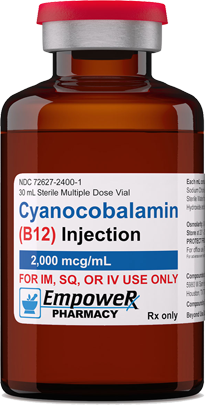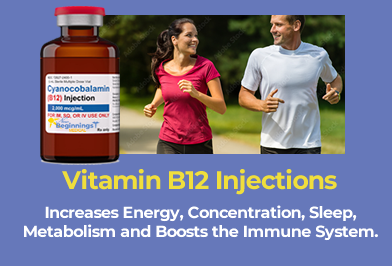
Home » B-12 Injections » Vitamin B12 Injection [Cyanocobalamin]
Vitamin B12 Injection [Cyanocobalamin]
Cyanocobalamin, or vitamin B12, is a B-vitamin. It is found in a variety of foods such as fish, shellfish, meats, and dairy products. Deficiency in healthy individuals is rare; the elderly, strict vegetarians (i.e., vegan), and patients with malabsorption problems are more likely to become deficient. If vitamin B12 deficiency is not treated with a vitamin B12 supplement, then anemia, intestinal problems, and irreversible nerve damage may occur. Oral therapy is not always effective, as some persons lack in-
trinsic factor, an endogenous substance produced by the stomach and necessary for oral B12 absorption. Other patients may not be able to absorb oral vitamin B12 due to surgical removal or dysfunction of the intestines in the area where absorption of
vitamin B12 occurs.
$150.00
$219.00Add to cart
Product Details
General Information
Who should not take this medication
Pregnancy
Breast Feeding
Side Effects
Storage
General Information
Cyanocobalamin, or vitamin B12, is a B-vitamin. It is found in a variety of foods such as fish, shellfish, meats, and dairy products. Deficiency in healthy individuals is rare; the elderly, strict vegetarians (i.e., vegan), and patients with malabsorption problems are more likely to become deficient. If vitamin B12 deficiency is not treated with a vitamin B12 supplement, then anemia, intestinal problems, and irreversible nerve damage may occur. Oral therapy is not always effective, as some persons lack intrinsic factor, an endogenous substance produced by the stomach and necessary for oral B12 absorption. Other patients may not be able to absorb oral vitamin B12 due to surgical removal or dysfunction of the intestines in the area where absorption of
vitamin B12 occurs.
Who should not take this medication
Patients with early hereditary optic nerve atrophy, cyanocobalamin hypersensitivity, and those who are pregnant. Your Primary Health Care Provider needs to know if you have any of these conditions: kidney disease; Leber’s disease; megaloblastic anemia; an unusual or allergic reaction to cyanocobalamin, cobalt, other medicines, foods, dyes, or preservatives; pregnant or trying to get pregnant; breast-feeding. The usual daily recommended amounts of cyanocobalamin, vitamin B12 either through
dietary intake or supplementation should be taken during pregnancy.
Pregnancy
Parenteral and intranasal cyanocobalamin, vitamin B12 are classified as pregnancy category C. Adequate studies in humans have not been conducted; however, no maternal or fetal complications have been associated with doses that are recommended during pregnancy, and appropriate treatment should not be withheld from pregnant women with vitamin B12 responsive anemias. The usual daily recommended amounts of cyanocobalamin, vitamin B12 either through dietary intake or supplementation should be taken during pregnancy
Breast Feeding
Cyanocobalamin is distributed into breast milk in amounts similar to those in maternal plasma, and distribution in breast milk
allows for adequate intakes of cyanocobalamin by breast-feeding infants. Adequate maternal intake is important for both the mother and infant during nursing, and maternal requirements for vitamin B12 increase during lactation.
Side Effects
Call your Primary Health Care Provided immediately if you are experiencing any signs of an allergic reaction: skin rash, itching
or hives, swelling of the face, lips, or tongue, blue tint to skin, chest tightness, pain, difficulty breathing, wheezing, dizziness, red, swollen painful area on the leg. In most cases, cyanocobalamin is nontoxic, even in large doses. Adverse reactions reported following cyanocobalamin administration include headache, infection, nausea/vomiting, paresthesias, and rhinitis.
Storage
Store this medication at 68°F to 77°F (20°C to 25°C) and away from heat, moisture and light.

